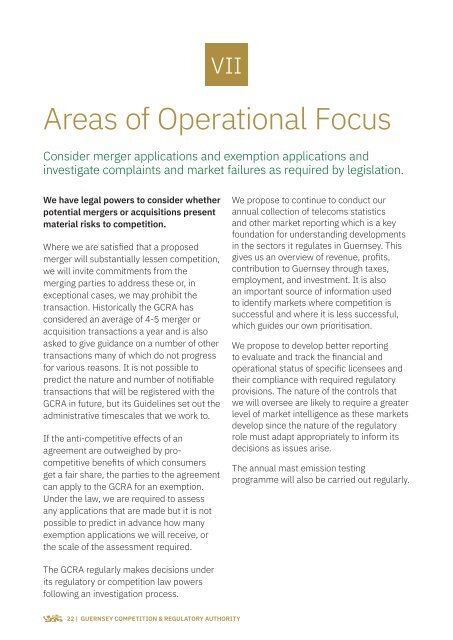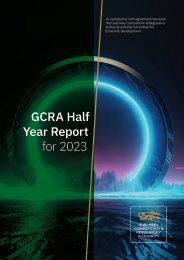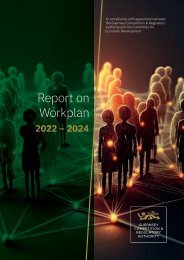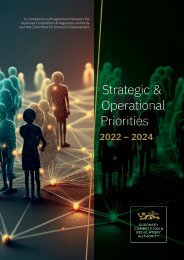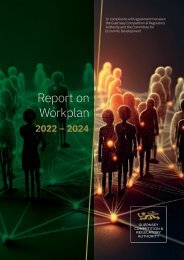GCRA - Strategic and Operational Priorities
Create successful ePaper yourself
Turn your PDF publications into a flip-book with our unique Google optimized e-Paper software.
VII<br />
Areas of <strong>Operational</strong> Focus<br />
Consider merger applications <strong>and</strong> exemption applications <strong>and</strong><br />
investigate complaints <strong>and</strong> market failures as required by legislation.<br />
We have legal powers to consider whether<br />
potential mergers or acquisitions present<br />
material risks to competition.<br />
Where we are satisfied that a proposed<br />
merger will substantially lessen competition,<br />
we will invite commitments from the<br />
merging parties to address these or, in<br />
exceptional cases, we may prohibit the<br />
transaction. Historically the <strong>GCRA</strong> has<br />
considered an average of 4-5 merger or<br />
acquisition transactions a year <strong>and</strong> is also<br />
asked to give guidance on a number of other<br />
transactions many of which do not progress<br />
for various reasons. It is not possible to<br />
predict the nature <strong>and</strong> number of notifiable<br />
transactions that will be registered with the<br />
<strong>GCRA</strong> in future, but its Guidelines set out the<br />
administrative timescales that we work to.<br />
If the anti-competitive effects of an<br />
agreement are outweighed by procompetitive<br />
benefits of which consumers<br />
get a fair share, the parties to the agreement<br />
can apply to the <strong>GCRA</strong> for an exemption.<br />
Under the law, we are required to assess<br />
any applications that are made but it is not<br />
possible to predict in advance how many<br />
exemption applications we will receive, or<br />
the scale of the assessment required.<br />
We propose to continue to conduct our<br />
annual collection of telecoms statistics<br />
<strong>and</strong> other market reporting which is a key<br />
foundation for underst<strong>and</strong>ing developments<br />
in the sectors it regulates in Guernsey. This<br />
gives us an overview of revenue, profits,<br />
contribution to Guernsey through taxes,<br />
employment, <strong>and</strong> investment. It is also<br />
an important source of information used<br />
to identify markets where competition is<br />
successful <strong>and</strong> where it is less successful,<br />
which guides our own prioritisation.<br />
We propose to develop better reporting<br />
to evaluate <strong>and</strong> track the financial <strong>and</strong><br />
operational status of specific licensees <strong>and</strong><br />
their compliance with required regulatory<br />
provisions. The nature of the controls that<br />
we will oversee are likely to require a greater<br />
level of market intelligence as these markets<br />
develop since the nature of the regulatory<br />
role must adapt appropriately to inform its<br />
decisions as issues arise.<br />
The annual mast emission testing<br />
programme will also be carried out regularly.<br />
The <strong>GCRA</strong> regularly makes decisions under<br />
its regulatory or competition law powers<br />
following an investigation process.<br />
22 | GUERNSEY COMPETITION & REGULATORY AUTHORITY


